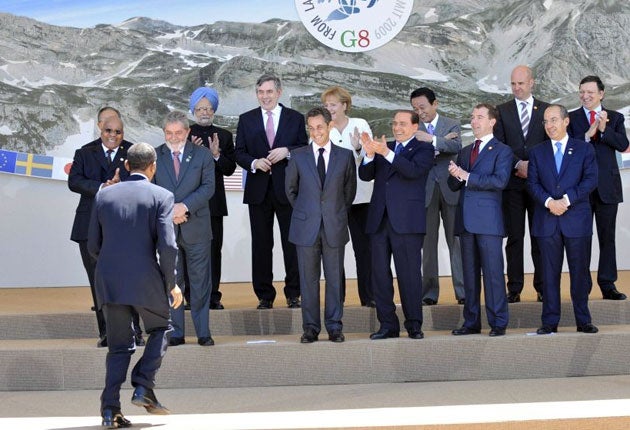Obama plans nuclear talks to lift threat of proliferation
Britain insists £25bn Trident programme 'not on the table' in March meeting

Barack Obama has called a global summit on reducing the world's stockpile of nuclear weapons which could eventually result in Britain's Trident system being scaled back.
The US President told G8 leaders at their meeting in Italy yesterday that between 20 and 30 nations would be invited to the non-proliferation summit in Washington next spring. He hopes to build on his successful disarmament talks held on Monday with the Russian President, Dmitry Medvedev.
The US-led initiative could pave the way for the world to warn Iran and North Korea that they would be treated as "pariah states" unless they stop developing nuclear weapons. The burden of proof would be on countries that are not yet members of the nuclear club to show they had not breached the Nuclear Non-Proliferation Treaty, raising the prospect of attempts to send weapons inspectors in if they refused to comply.
Britain will take part in the Washington summit. British officials insisted that Trident would not be "on the table" in March, but confirmed it could eventually form part of the talks if they resulted in a process of multilateral disarmament. They played down the chances of the £25bn Trident programme being axed as part of a drive to cut public spending, saying the "fixed costs" of the four submarines which carry the weapons accounted for the bulk of the budget, so reducing the number of warheads would not save much.
Gordon Brown will publish Britain's proposals for a historic "new deal on nuclear security" in the world in the next few days. He has told Mr Obama that he believes there is a chance of securing a trade-off under which countries promise not to develop nuclear weapons in return for help with developing civil nuclear power.
The Prime Minister told journalists: "Iran is attempting to build a nuclear weapon. North Korea is attempting to build a nuclear weapon. We have got to show we can deal with this by collective action.
"Unilateral action by the United Kingdom would not be seen as the best way. What we need is collective action by the nuclear weapons powers to say that we are prepared to reduce our nuclear weapons, but we need assurances also that other countries will not proliferate them. And we need new kinds of assurances to prevent a situation such as we have got in Iran emerging in exactly the same way again."
At talks in the Kremlin on Monday, the US and Russian presidents agreed to limit their arsenals of strategic nuclear weapons to a range of between 1,500 and 1,675 each and their strategic delivery vehicles to between 500 and 1,100 each . The current maximum levels are 2,200 warheads and 1,600 launch vehicles.
Mr Brown, who said he had submitted proposals to Mr Obama on the issue, added: "There is a possibility of a nuclear deal that we will help countries that are non-nuclear gain access to civil nuclear power and to do it in a way that is safe for the whole of the world, but we want them to agree to tight conditions about non-proliferation of nuclear weapons. We will try at the same time to talk with Russia and America to achieve some reduction in nuclear weapons."
Mr Brown denied that he wanted to treat countries like Iran as "guilty until proven innocent", but insisted that nations signing up to non-proliferation agreements ought to be able to prove that they were complying with them.
He described nuclear proliferation and the danger of nuclear material falling into the hands of terrorists such as al-Qa'ida as "one of the big issues of the world".
He added: "When the Non-Proliferation Treaty was signed there were five nuclear weapons states. Now there are nine and the possibility of Iran, North Korea and others may seek to acquire nuclear weapons and we will have a big rise in nuclear weapons states in this decade. That is a problem for the whole of the world that has got to be addressed."
The G8 summit backed Britain over the detention of nine British embassy staff in Iran, and France over the French lecturer Clotilde Reiss who has been detained for a week in Iran over what Paris describes as allegations of spying. G8 leaders expressed "serious concern" over recent events in Iran, deplored violence against peaceful demonstrators and called on the Iranian authorities to stop the intimidation of foreign missions.
Join our commenting forum
Join thought-provoking conversations, follow other Independent readers and see their replies
Comments